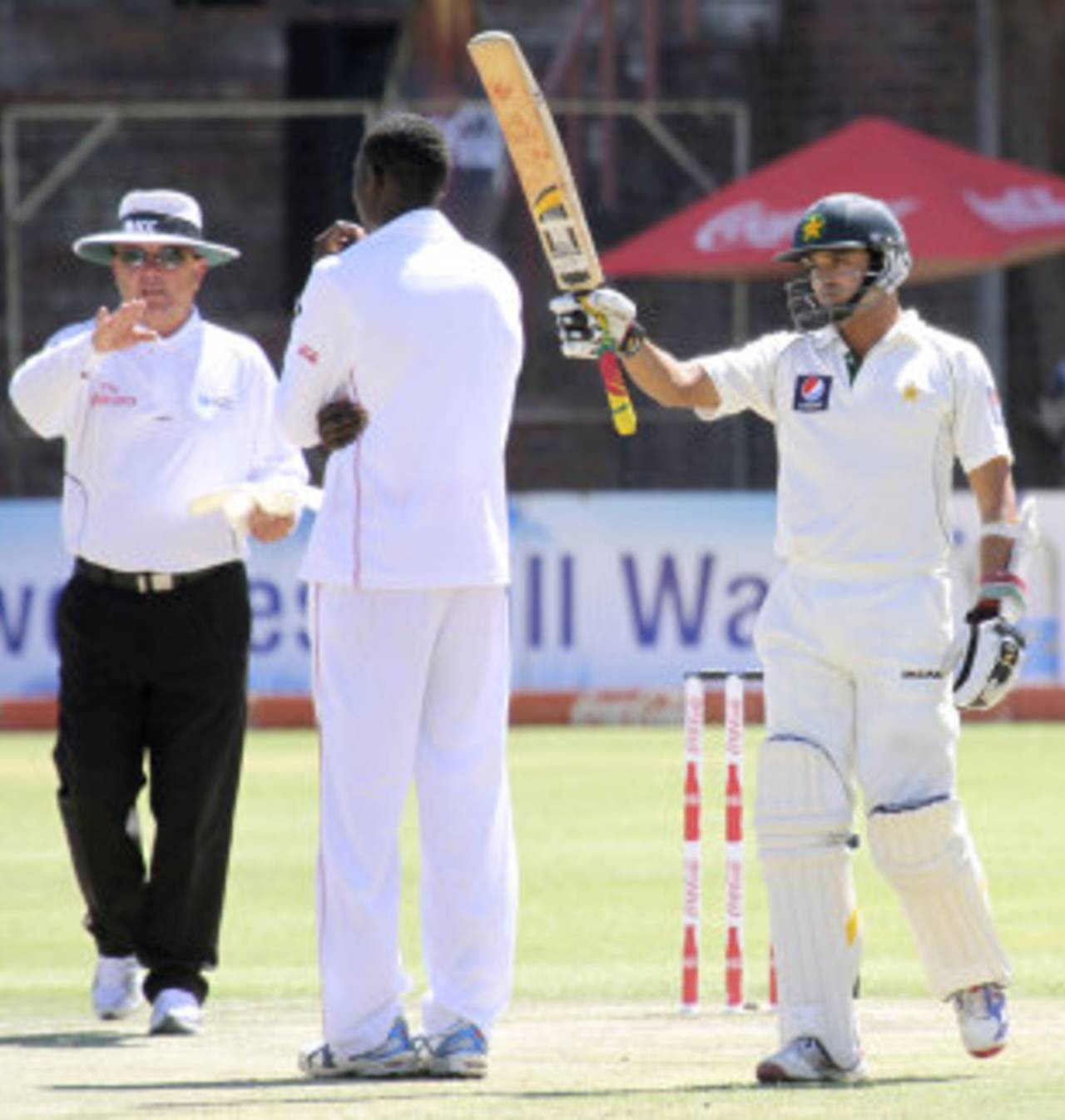Cautious Pakistan set the base
The visitors chugged along far slower than was expected of them on a flat pitch that offered nothing to an inexperienced Zimbabwe attack
Firdose Moonda in Bulawayo
Sep 3, 2011, 5:47 PM

Azhar Ali was patience personified • Associated Press
It was a summer's day so warm that Tatenda Taibu walked out to field in a floppy hat rather than his usual cap or helmet and Pakistan's players probably depleted the town's entire stock of sun cream. There was the kind of balmy breeze threading its way through the trees that made it pleasant enough to sit outside and just the right amount of golden glow for people to laze in its aura. So, that's what Pakistan's batsmen did.
Pakistan made 241 runs in the day's 91 overs, chugging along far slower than was expected of them on a flat pitch that offered nothing to an inexperienced Zimbabwe attack. They made few attempts to find the fast-forward button even as it glowed in front of them. Instead, they preferred to keep their finger on pause, occasionally venturing in the direction of rewind and even more occasionally hitting play at the regular speed.
Still, caution is not a quality to be frowned upon, especially when the merits of a solid base are weighed up. Every team needs someone who can amass runs without risk. They need a player who can conjure up the concentration to maintain a strike-rate of less than 40 for the better part of two days, but inch his way to a massive total.
They need one, perhaps two of these, but for some reason, Pakistan felt that it was a good idea to have three of them grind out the day. Only Mohammad Hafeez and, surprisingly, Misbah-ul-Haq, showed any signs of intent or forcefulness on a day when a little of either could have gone a long way.
Azhar Ali crawled to a competent 75 off 193 balls, Younis Khan laboured to an unbeaten 61 off 193 and Umar Akmal scratched to 15 off 39 before being caught off the rebound from a ball that hit short leg. All three batsmen clearly possess the ability to bat more eloquently but opted for inhibition instead.
Pakistan indicated that one of the aims of this tour was to blood youngsters. It's a necessary task for any team that involves some on-the-job training, like how to build an innings in international cricket. Still, Test matches cannot be used as training grounds and there is a match to be won and a reputation to enhance and neither of those are likely to be achieved with the kind of batting Pakistan had on display today.
Conditions may deteriorate going into the last two days, with some dust clouds floating around on the third day. The substantial grass covering was thought to act as a guard against excessive breaking up but the heat has dried the surface, causing the cracks to come to the fore. It will also slow down but the batsmen can still expect to have an advantage over their bowling counterparts, especially the seamers, who are destined for more drudgery in the remainder of the match.
Still, Pakistan may have had justifiable reasons for their application and method today, with more of them being individual than collective. Azhar Ali's approach, for example, may stem from his poor conversion rate. In 13 Test matches, including this one, he has scored nine fifties but no hundreds. He has been out twice in the nineties - first when he was stranded on 92 against England at The Oval in August last year and then two months later against South Africa, when he reached 90 only to fall victim to Dale Steyn. He has scored half-centuries in both innings of matches against South Africa and West Indies, helping save Tests on those occasions, but he has yet to bring up the three-figure mark and looked set to do so today.
At first, he acted as a foil to Hafeez who was going for his shots, but when Younis came in, the brakes were firmly pressed on. The senior statesman of the Test side had said that he wanted to show youngsters how to build a team total of 500 or 600. With circumspection his middle name, Younis approached his task in supremely measured fashion. He could well be demonstrating the effort required to score half a thousand runs, although he may need a Test longer than five days to do it in.
Misbah had a refreshingly sparkly attitude to his innings which started off with the characteristic forward defensive that is a thing of beauty in itself. The elegance and poise that goes into playing the least profitable of all shots is remarkable but most were thankful that they didn't have to ensure too many of those today. He took on Greg Lamb, in particular, and ensured that he didn't get bogged down by some nagging bowling.
Umar Akmal's reservation was perhaps the most unexpected of the lot. A naturally aggressive strokeplayer, Akmal was tied down by the seamers, who had learnt that they couldn't pitch it up quite as much as they would like to, and the spinners, who were benefitting from the few cracks that had started to emerge. Like all the other batsmen before him he was dropped but he looked set to solider on and will be disappointed to have got out on the close of play.
Pakistan will certainly prefer to bat once and at the pace they are going, it seems likely that will happen. With a long tail, their lethargic approach today may have benefits if they can complement it with a burst tomorrow, to give themselves a lead and enough time to bowl Zimbabwe out.
Firdose Moonda is ESPNcricinfo's South Africa correspondent